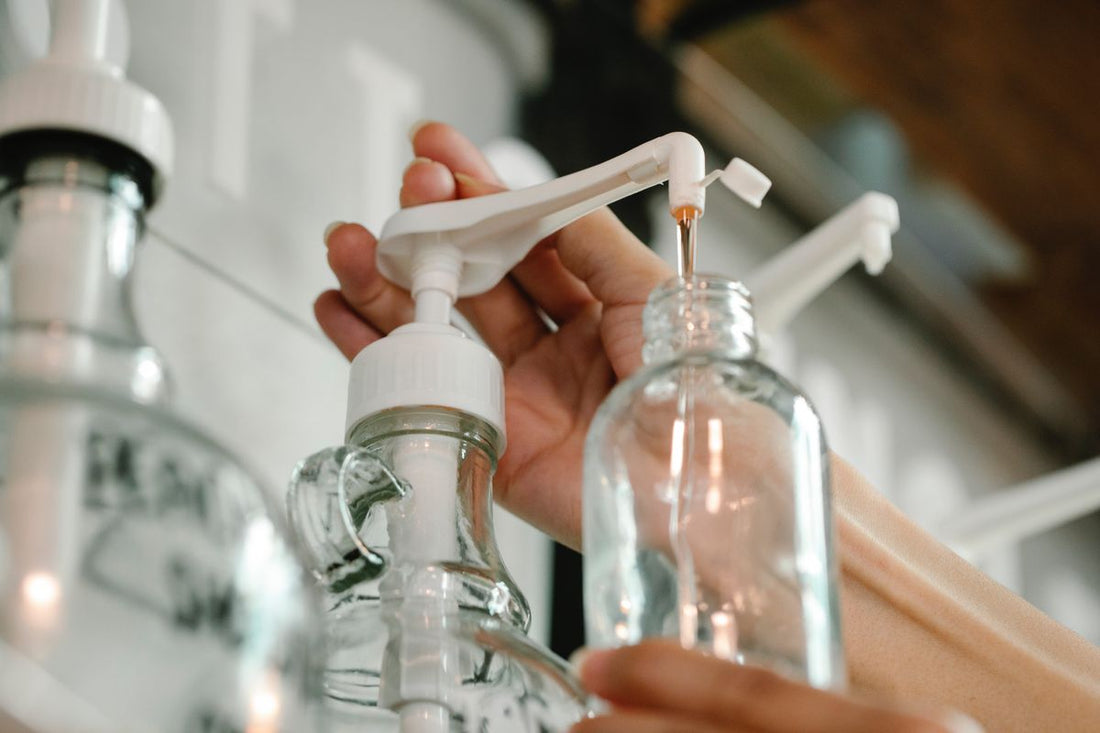
Homemade Aleppo liquid soap
Share
Lately, we have been repeatedly asked if we could explain how to make homemade liquid soap from Jegit - Aleppo soap.
There are many reasons why people are increasingly looking for such alternatives: either they want to avoid the numerous additives often found in purchased products, or they want to reduce plastic usage since most commercial products are sold in plastic containers.
For all those interested in homemade products for these reasons or a combination thereof, we have a simple recipe here for making your own liquid soap.
The basic recipe requires only two ingredients: a piece of Jegit - Aleppo soap and some water. Jegit - Aleppo soap is known for its skin-nourishing properties and is often used to alleviate skin problems such as acne, eczema, or psoriasis. To transform this solid soap into liquid soap, we also need some water and optionally dried herbs for fragrance and additional nourishing properties. In our example, we use dried mint, but chamomile, sage, or rosemary are suitable alternatives as well.
What You Need
To make your liquid Aleppo soap, you will need the following:
Ingredients:
- Piece of Aleppo soap (about 30 grams)
- 200 milliliters of water
- Dried mint (optional)
- Essential oils (optional, for fragrance)
Tools Required:
- A pot for heating the water
- A grater or knife for shredding the Aleppo soap
- A spoon or whisk for stirring the mixture
- A bottle for storing the homemade liquid soap (made of glass or thoroughly rinsed plastic)
- A sieve for removing the herbs after steeping (if using mint or other herbs)
Instructions
Here are the exact steps to make your own liquid soap:
- Boil 200 milliliters of water and add some dried mint. Let this mixture steep for 10 minutes.
- In the meantime, grate or cut a piece of Aleppo soap into small pieces. We need about 30 grams for one batch.
- After the 10 minutes, remove the herbs from the water and bring the liquid to a boil again. Add the shredded Aleppo soap and stir until the soap is completely dissolved.
- Remove the mixture from heat and let it cool, stirring every few minutes. Don't worry if the soap appears very liquid at first – the consistency will thicken as it cools.
- If desired, you can add a few drops of essential oil to create an additional fragrance.
After a few hours, you should notice that the consistency has significantly gelled. Now you can pour your homemade liquid soap into a bottle. A well-rinsed empty bottle of purchased liquid soap can be used for this purpose, but a glass bottle is also an option – just be careful as glass can be a hazard in the shower if it falls and breaks.
Depending on the soap, you may need to adjust the quantities a bit. If your soap is too liquid, simply bring it to a boil again and add more Aleppo soap.
Benefits of Homemade Liquid Soap from Aleppo Soap
- Natural and healthy: Aleppo soap is made from natural ingredients and is free of chemical additives. It is particularly suitable for people with sensitive skin or allergies to certain chemicals. Furthermore, it is good for the environment as it is biodegradable.
- Easy to handle: Liquid soap is easy to dose and use, especially when showering after sports, in the swimming pool, or in the sauna. There is no risk of it falling on the floor and getting dirty or lost, as could be the case with solid soap.
- Beneficial for the skin: Aleppo soap has many skin-nourishing properties. It is known to alleviate skin problems such as acne, eczema, or psoriasis and keep the skin soft and nourished. These benefits are retained when transformed into liquid soap.
- Economical: With just a small piece of Aleppo soap and some water, you can produce a large amount of liquid soap. This is often cheaper than buying commercial liquid soap, especially considering that many commercial soaps have water as the main ingredient.
- Customizable: You can customize the fragrance and consistency of your liquid soap according to your preferences. Simply add your favorite essential oils or experiment with different amounts of water and soap to achieve the perfect consistency.
- Reduced plastic waste: By making your own liquid soap and storing it in reusable containers, you contribute to reducing the consumption of disposable plastic. This is beneficial for both the environment and your wallet.